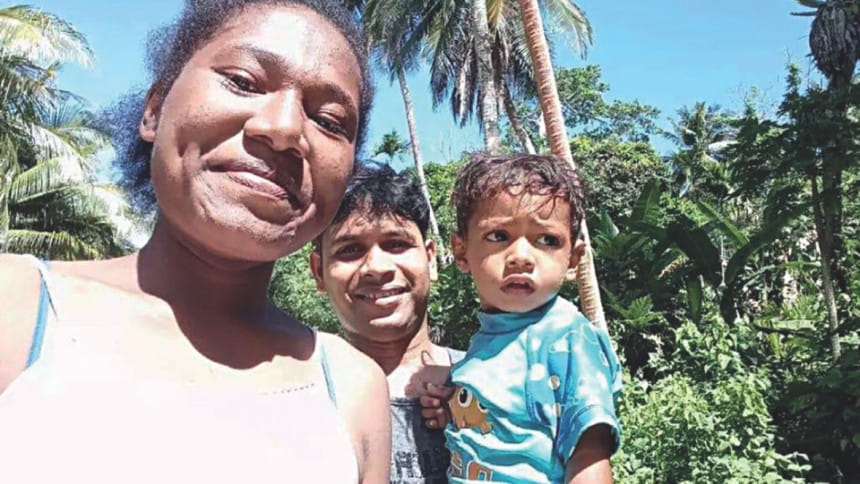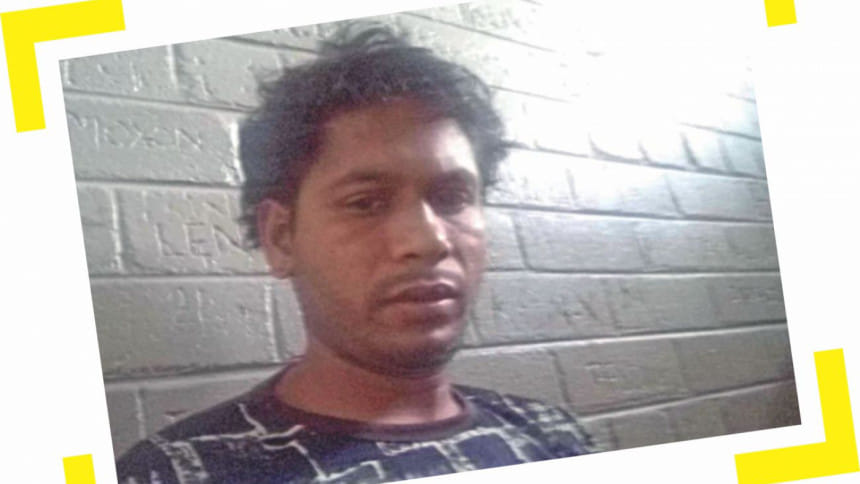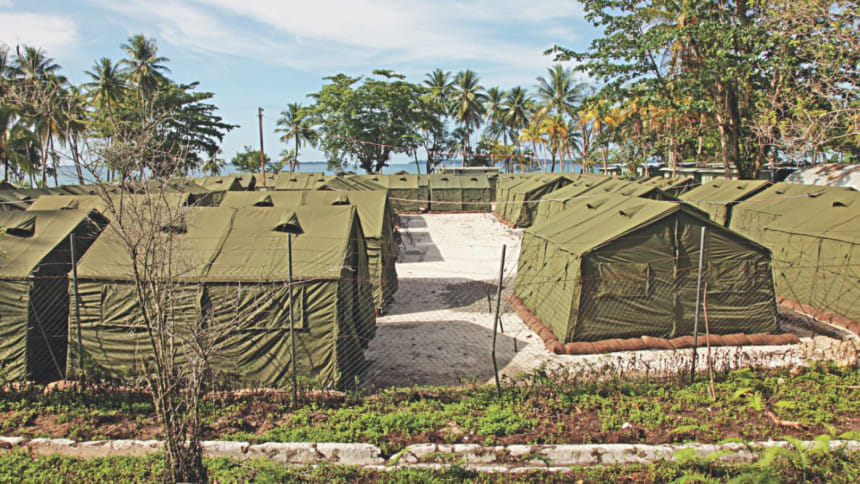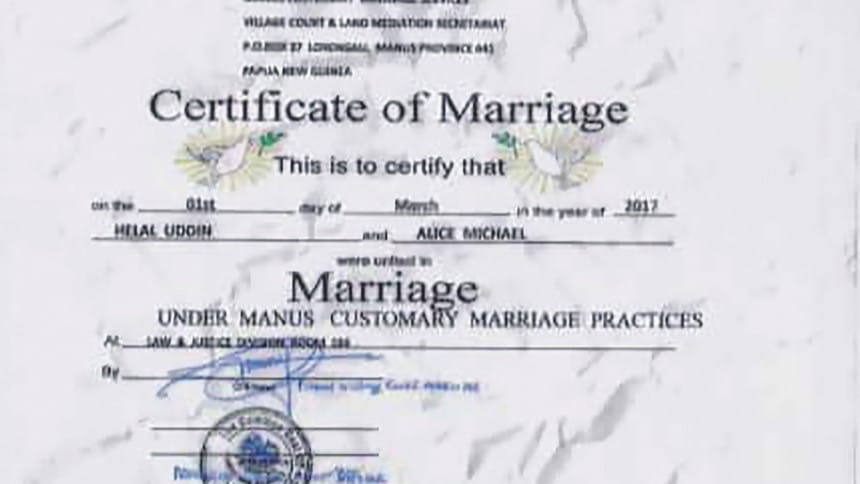A MIGRANT'S VOYAGE

Md Helal Uddin, a 29-year-old young man from Bangladesh, has been languishing in the prisons of Papua New Guinea (PNG) for almost a month. The accusation against him is that he entered the country illegally. Helal never claimed that he entered PNG legally; but he could not find any other way to get back to his wife Alice Michael, a native of PNG, and his two-year-old son Mohammad Ali. How Helal raised his family in such a remote country in the Pacific where hardly any Bangladeshis have even set foot, is a mindboggling story of adventure, love and sacrifice.
Born and raised in Joatpur village under Burichong upazila of Cumilla district, Helal never wanted to leave his home. He used to support his elderly parents, who are poor farmers, by working as a peon in the local office of the Bangladesh Nationalist Party (BNP). However, his luck started to run out after the election of 2008 when BNP suffered a major electoral defeat. By 2012, many of his leaders were in jail or on the run and the local BNP office where Helal worked was closed. Jobless and under threat of being arrested or tortured, Helal saw no alternative to leaving Cumilla. At that time, Helal was contacted by some of the BNP workers who were planning to go to Malaysia in search of work and shelter. Helal agreed to join them, lured by the promise of work opportunities and a better life. He invested all his savings of around Tk 100,000 and confirmed his place on that fateful journey.
Instead of going to Dhaka, however, Helal was asked to reach Teknaf by February 21, 2013. When he reached the rendezvous point, he was informed that his journey to Malaysia would be by boat, not by airplane. He was terribly frightened but it was too late to back out. He was forcefully taken aboard a small wooden fishing trawler with 250 other people. Helal's voyage started on February 22, 2013.
When Helal reached Thailand on the first week of March, three of his fellow passengers died of sea-sickness and fever; their bodies were thrown aboard. Due to excessive shortage of food and drinking water, Helal was also in a bad state. He purchased some food and water from Thailand and started for Malaysia again.
However, due to strict patrolling by the Malaysian coast guard, the boat could not even get close to the Malaysian coast, and had to move towards Indonesia. When several Rohingyas protested against this change of destination, three of them were shot in cold blood and their dead bodies were kept to rot in the boat for three days to frighten the other passengers.
The boat finally moored on the coast of an Indonesian jungle and the sailors forced all the passengers to disembark. The captain of the boat told the passengers how to reach nearby towns, gave them some rations and left with the boat. Helal stayed in the jungle for around five months. "At first I survived by eating leaves and fruits. Some days later, I moved to a nearby village and worked as a labourer in a fishing quay," says Helal.
Finally, Helal learned about a boat which would take some refugees to Christmas Island, an external territory of Australia in the Indian Ocean, where they could apply for asylum in Australia. He managed to get on board and after sailing for a week through the treacherous Indian Ocean, he finally reached the shores of Christmas Island in the first week of August 2013.
It was only the beginning of a new struggle. Helal's plea for asylum was rejected as he could not prove his direct political involvement. "As far I know, they examined whether there was any case filed against me with the local police station. But there was none. I could not make them understand that it does not mean I am not under threat," says Helal. Ultimately, Helal and some other refugees were taken to Manus Island Regional Processing Centre, in PNG. Developed as an offshore Australian immigration detention facility, this centre has been criticised internationally because of its poor living conditions and abuse of human rights. According to a report by BBC News, an Iranian asylum seeker died of infection in the centre in 2014 and in 2017, several detainees were injured when PNG defence personnel fired many shots into the compound.
Helal claims, "Australian security officials told us that if we tried to leave the Island, we would be eaten alive by cannibals. They showed us pictures of native people of the Island wearing leaves and skins and flashing their blood red teeth."
It was among these "cannibals" that Helal found the love of his life. Helal knew some English and has great culinary skills—and using these talents, he gradually earned admiration among the refugees and security officials. After almost two years of confinement till 2015, the security around him was relaxed, and he was granted relative freedom to walk around the island till sunset. This was when Helal met his future wife Alice.

Alice Michael is a native of a village near Lorengau Town of Manus Island. Her family runs a small business and fish in the sea. According to Alice, "I met Helal at the sea beach where I used to go to collect coconut leaves. He was very gentle and chivalrous. He used to help me collect coconut leaves. He used to pick coconuts for me. I was so shocked by listening to his stories. I felt very sorry for him. One day he asked me about cannibals with red teeth. I laughed at him. I chewed a betel nut laced with mustard and lime and showed him how it turned my teeth red. He felt relieved."
The couple got married in 2016 following the customary and legal procedures of Manus Island. Unfortunately, Helal's good fortune did not last long. He was informed by the security officials that he would soon be deported to Bangladesh. When Helal and his wife revealed their marital status and appealed for citizenship, Helal was told to produce a marriage certificate. Despite submitting one, he was deported to Bangladesh on March 3, 2017, leaving his pregnant wife in PNG, and was told to apply for citizenship from Bangladesh.
On March 19, 2017 his son Mohammad Ali was born. "When I heard about my son's birth, I became desperate to return to my wife. Since there is no PNG diplomatic mission in Bangladesh, I travelled to India and visited the PNG high commission there several times. Describing our family's situation, I wanted to apply for citizenship or obtain a visa. But the high commission did not pay any heed to my appeal. So, when I failed through the legal procedure, I followed the alternative option."
This time, Helal willingly contacted the human traffickers who could take him to Indonesia by boat. Again, after spending around Tk 100,000, which he earned by selling menial labour for almost a year, he embarked on another do-or-die mission on August 4, 2018. Helal sailed from Teknaf by a fishing trawler to Indonesia. On the way, he was chased by Myanmar's coast guards, and escaped. The ramshackle fishing trawler was struck by storms thrice and several passengers were washed away. "It was only Allah who saved me during that perilous journey. When we reached the coast of Thailand, our boat was attacked by pirates from Myanmar. They looted all our belongings and killed some of my fellow passengers. Thanks to Allah, I survived again. But when we reached Thailand in early September, we had no money to purchase rations. I collected leftover food and water bottles thrown away by other people to survive the rest of my journey," describes Helal.
After another stretch of arduous voyage, Helal finally reached Indonesia on October 4, 2018. Thanks to his familiarity with the place and the people, he managed to convince a fisherman to employ him as his helper. He earned sufficient money after a month to get on a boat which would take him to Jayapura, the capital of the Indonesian province of Papua on November 7, 2018. From there, he took another boat to reach the Vanimo town of Sandaun province of PNG.

Then came one of the most difficult parts of his journey—300 kilometres of walking to a small town called Wewak, where he knew some of Alice's relatives lived. He hid in the jungle by day and walked along the beaches by night for seven days at a stretch. Finally, with the help of some native fishermen, he managed to reach Alice's relatives' house in Wewak. They took him to Mal Island by boat, where he finally reunited with his wife on November 18, 2018.
"I fell seriously ill. After a week of constant care by my wife, my sister-in-law and mother-in-law, I started to recover gradually," says Helal. But Helal did not sit idle. He soon set up a grocery shop that also doubled as a restaurant. Local people loved his cooking so much that they named him "Spicy." According to Alice, "Within two months, Helal's food and grocery shop became very popular among Mal Islanders and even foreign tourists. He used to write his name as "Helal (Spicy) Uddin. Upon my family's request, he also converted to Christianity."
But his luck betrayed him again when, on March 15 this year, Helal and his in-laws visited Wewak town to get a national identity card (NID). "I needed an NID so that I could register my business. I was told by the local priest that since I had converted to Christianity, there would be no problem in getting the card." Unfortunately, the officials recognised him as a foreigner, based on his physical features, which are somewhat distinct from the locals of PNG. They informed the police. Two days later, on March 17, he was arrested by the PNG police for illegally entering the country. He was first imprisoned in Wewak jail for seven days and then transferred to Boroko cell in Port Morseby. Since March 17, Helal has been languishing in the jail without any legal assistance.
Once again his culinary skills are helping him survive. Helal has been cooking for the officers and prisoners of the Boroko cell; in exchange, he is unofficially allowed to talk to his family members.

"In our three years of conjugal life, Helal tried his best to care for me and our child. He loves this country. He was never involved with any illegal activities. We tried our best to apply for his citizenship when he was deported but we failed. This is why he entered PNG illegally. He has every right to be a citizen here and I appeal to our government to release him and offer him citizenship for the sake of my family and my child," appeals Alice.
Helal's story has been published in a couple of Australian media outlets, and human rights organisations there have expressed their concern about Helal's current condition. Ian Rintoul, coordinator of Refugee Action Coalition, an Australia based human rights organisation, says, "Helal should be able to stay in PNG and apply for citizenship to be with his family. His arrest and imprisonment is an abuse of his human rights. We hope that the issue of his most recent entry to PNG will be resolved quickly. Helal has shown enormous resourcefulness, commitment and loyalty to support his wife and child. The PNG government should act quickly. Helal would be an asset for PNG."
Unfortunately, PNG government has yet to realise this and, without any legal assistance and support from the human rights organisations, Helal's fate still hangs in the balance.
Md Shahnawaz Khan Chandan can be contacted at [email protected]

 For all latest news, follow The Daily Star's Google News channel.
For all latest news, follow The Daily Star's Google News channel. 



Comments